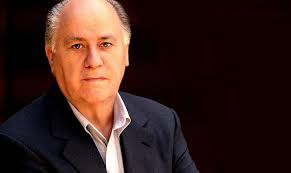- Home
- Billionaires
- Investing Newsletters
- 193CC 1000
- Article Layout 2
- Article Layout 3
- Article Layout 4
- Article Layout 5
- Article Layout 6
- Article Layout 7
- Article Layout 8
- Article Layout 9
- Article Layout 10
- Article Layout 11
- Article Layout 12
- Article Layout 13
- Article Layout 14
- Article Sidebar
- Post Format
- pages
- Archive Layouts
- Post Gallery
- Post Video Background
- Post Review
- Sponsored Post
- Leadership
- Business
- Money
- Small Business
- Innovation
- Shop
Recent Posts
Amancio Ortega: The Fashion Titan Behind Zara’s Global Empire

Amancio Ortega, the enigmatic founder of the Inditext Group and the visionary behind the world-famous Zara brand, is one of the most successful and wealthiest entrepreneurs in modern history. Born on March 28, 1936, in the small town of Busdongo de Arbás in León, Spain, Ortega’s journey to becoming a global fashion magnate is a compelling story of hard work, innovation, and a deep understanding of consumer behavior. Raised in modest conditions, Ortega’s early life was far removed from the glamour and scale of the fashion world he would later come to dominate. His father was a railway worker, and his family eventually moved to A Coruña, where Ortega would spend most of his youth.
At the age of 14, he left school and began working as a delivery boy for a local shirtmaker named Gala, where he learned to make clothes by hand. It was during this period that Ortega developed an appreciation for garment design, fabric, and manufacturing. He soon discovered the limitations and inefficiencies in traditional fashion supply chains and dreamed of a more responsive and consumer-focused approach. Driven by ambition and a vision for affordable fashion, Ortega founded a small company in the early 1960s called Confecciones Goa, which produced quilted bathrobes. This modest operation set the foundation for what would become Inditex, one of the largest fashion retail groups in the world.
In 1975, Amancio Ortega opened the first Zara store in A Coruña. His concept was revolutionary for the time: fashionable, quality clothing at affordable prices, produced quickly to reflect current trends. The idea of “fast fashion” was born, and Zara soon gained popularity among Spanish consumers. Ortega’s model disrupted traditional retail methods by emphasizing vertical integration, which allowed Zara to design, manufacture, distribute, and sell its products within an extraordinarily short time frame. Instead of relying on seasonal fashion calendars, Ortega’s strategy focused on rapid turnaround, ensuring that new collections could be delivered to stores every few weeks based on real-time customer feedback.
Ortega’s approach proved to be not only innovative but also incredibly profitable. By the 1980s and 1990s, Zara had expanded throughout Spain and across Europe. The brand’s success led to the formation of the Inditex Group in 1985, which would go on to include other popular labels such as Massimo Dutti, Pull & Bear, Stradivarius, Bershka, and Oysho. Ortega’s empire was growing rapidly, built on a foundation of data-driven production, efficient logistics, and keen insight into consumer behavior. Under his leadership, Inditex grew into the world’s largest fashion retailer, with thousands of stores operating in over 90 countries and an ever-growing presence online.
Despite his monumental achievements, Ortega is famously private and media-shy. He has rarely granted interviews and prefers to let his work speak for itself. He was known for his low-profile lifestyle even as his fortune grew into the tens of billions. Ortega rarely wore suits and often worked from a modest office within Zara’s headquarters in Arteixo, near A Coruña. His humility and preference for discretion stand in stark contrast to the flamboyant personas often associated with the fashion industry. Yet, those who have worked with him describe Ortega as a demanding, detail-oriented leader who emphasized efficiency, innovation, and customer satisfaction.
In 2011, Ortega stepped down as chairman of Inditex but continued to influence the company’s direction through his significant ownership stake. His daughter, Marta Ortega, has since taken on a more prominent role in the business and was named chairwoman of Inditex in 2022. The transition marked a new era for the company, blending legacy with fresh leadership while maintaining the values and principles that had driven its phenomenal success. Amancio Ortega’s wealth has placed him among the richest individuals in the world, often vying for the top positions with tech titans like Jeff Bezos and Elon Musk. Yet, beyond his financial success, Ortega is also known for his philanthropic contributions, particularly in Spain. Through the Amancio Ortega Foundation, he has donated hundreds of millions of euros to healthcare, cancer research, and education, funding the purchase of advanced medical equipment and scholarships for students. These philanthropic efforts have earned him admiration both within and outside the business community.
One of the most impressive aspects of Ortega’s legacy is his transformation of the fashion industry itself. By pioneering fast fashion, he changed how clothes are designed, produced, and consumed. His business model has been studied in top business schools around the world and has influenced countless other retailers. However, it has also sparked debate and scrutiny regarding sustainability and labor practices, prompting Inditex in recent years to adopt more environmentally conscious strategies. The company has set goals to use more sustainable fabrics and improve transparency in its supply chain, signaling an evolution in response to changing consumer expectations.
Amancio Ortega’s story is not just a tale of riches or fashion dominance. It is a story of resilience, innovation, and relentless pursuit of improvement. From humble beginnings to building a multi-billion-dollar empire, Ortega never lost sight of the fundamental principles that guided his rise—listening to the customer, staying agile, and building systems that adapt quickly to change. His legacy continues through the vast Inditex empire and the values he instilled in it. As Zara and its sister brands continue to redefine modern fashion, Ortega’s fingerprints remain on every design, decision, and innovation.
Though he may never be a household name in the same way as other billionaires, Amancio Ortega’s influence is undeniable. His clothes are worn by millions around the world, and his strategies have reshaped an entire industry. Whether he’s regarded as a genius of business logistics or the father of fast fashion, his contribution to global retail is immense and lasting. His life serves as a powerful reminder that even the quietest figures can lead revolutions—and sometimes, those revolutions are worn on our backs.
- A Coruña
- affordable fashion
- Amancio Ortega
- Amancio Ortega Foundation
- Arteixo
- Bershka
- brand development
- Business Leadership
- Business Legacy
- business tycoon
- clothing brand
- clothing production
- Confecciones Goa
- data-driven fashion
- economic influence
- education funding
- Entrepreneurship
- European billionaire
- Family Business
- fashion CEO
- fashion disruption
- fashion empire
- fashion industry
- fashion logistics
- fashion technology
- fast fashion
- garment industry
- global expansion
- global retail
- healthcare donations
- Inditex
- international fashion
- Marta Ortega
- Massimo Dutti
- minimalist entrepreneur
- modest lifestyle
- Oysho
- Philanthropy
- Pull & Bear
- real-time feedback
- retail innovation
- retail strategy
- self-made story
- Spain
- Spanish billionaire
- Stradivarius
- Sustainable Fashion
- textile industry
- vertical integration
- Visionary Leader
- Zara
Recent Posts
Categories
- 193 Countries Consortium Partner1
- 193cc Digital Assets2
- 5G1
- Aerospace & Defense48
- AI37
- Arts3
- Banking & Insurance11
- Big Data3
- Billionaires1,506
- Boats & Planes1
- Business332
- Careers13
- Cars & Bikes79
- CEO Network1
- CFO Network17
- CHRO Network1
- CIO Network1
- Cloud10
- CMO Network18
- Commercial Real Estate7
- Consultant1
- Consumer Tech194
- CxO1
- Cybersecurity73
- Dining1
- Diversity, Equity & Inclusion4
- Education7
- Energy8
- Enterprise Tech29
- Events11
- Fintech1
- Food & Drink2
- Franchises1
- Freelance1
- Future Of Work2
- Games149
- GIG1
- Healthcare79
- Hollywood & Entertainment203
- Houses1
- India’s 1000 Richest1
- Innovation46
- Investing2
- Investing Newsletters4
- Leadership65
- Lifestyle11
- Manufacturing1
- Markets20
- Media327
- Mobile phone1
- Money13
- Personal Finance2
- Policy569
- Real Estate1
- Research6
- Retail1
- Retirement1
- Small Business1
- SportsMoney42
- Style & Beauty1
- Success Income1
- Taxes2
- Travel10
- Uncategorized15
- Vices1
- Watches & Jewelry2
- world's billionaires1,475
- Worlds Richest Self-Made Women2
Related Articles
Francis Choi: The Toy Tycoon Behind a Billion-Dollar Empire
Francis Choi Chee-ming, often referred to as Hong Kong’s “King of Toys,”...
By 193cc World's BillionairesJune 6, 2025Francine von Finck and the Legacy of a Discreet Fortune
Francine von Finck, a name that commands respect in elite business circles,...
By 193cc World's BillionairesJune 6, 2025The Life and Legacy of Stefano Pessina
Stefano Pessina, one of the most influential figures in the global pharmaceutical...
By 193cc World's BillionairesJune 6, 2025John Morris: A Life of Vision, Growth, and Legacy
John Morris, the founder of Bass Pro Shops, is an iconic figure...
By 193cc World's BillionairesJune 6, 2025















Leave a comment